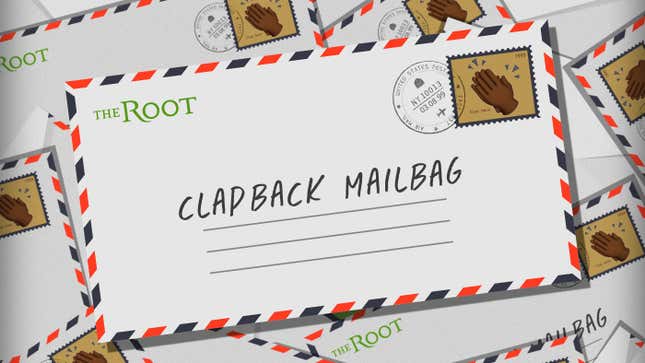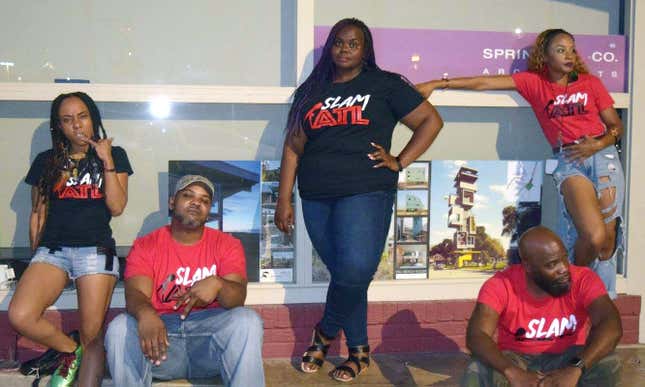
Why doesn’t the white community come together to solve racism? If white parents taught their children more history, maybe they wouldn’t have to worry about CRT in schools. And why won’t white people talk about all the racism in Mississippi?
If these questions seem absurd, it’s not as ludicrous as asking a random Black person who’s never murdered anyone, or even lived in the state of Illinois, to explain Chicago’s murder rate. If Black culture is responsible for their own demise, then white people, who control every single branch of the federal and state governments, are responsible for every flaw in American society.
White folks will ask these goofy-ass questions because they know they aren’t held to the same standards to which they hold everyone else. They get to live in a world where they are individual human beings and every other demographic in America acts as a monolithic collective. Maybe someone should tell them about this.
If only there was a way to clap back.
For instance, these readers offered some solutions for the questions raised in the article “We Need to Talk about Violence in the White Community (Seriously, We Do).”
From: Buzz
To: Michael HarriotI read your article on Yahoo about violence and whites.
Would you feel safer on the streets of Chicago or at the insurrection? Let’s try it and see who gets home safer.
From: Justicegurl
To: Michael HarriotYou forgot to point out that most of the perpetrators weren’t just white, they were white men. Your point becomes invalid when you lump people together. If you look at Chicago, most of the shootings are by Black men. As a Black men, maybe you could directly affect that problem because it’s caused by people you should be familiar with.
Others were concerned with the article about Derontae Martin’s death.
From: thinkthingsover
To: Michael Harriot
Subject: Derontae Martin articleMessage: Funny how you left out all the witnesses that said Martin was acting strangely and also that he had a gun. That was the majority of the witnesses, only 1 claimed he was killed and there was no evidence to support it. So some guy put racist posts on the internet, does not make them a murderer, are you insane? Youre not a journalist, you need to take that title away from your description. Youre a propagandist with an agenda.
From: Ward
To: Michael HarriotSubject: Teen suicide
Message: Mr. Harriot, your article concerning the most unfortunate events that led to Derontae‘s death leads one to question who and why the evidence was not handled properly. Still, being an asshole does not make one a murderer. Also, your biased argument is so weak and obvious that it fails to convince a murder was committed. I pray the truth prevails as I’m sure you do. I wish you would however use your superb talents to investigate and write about more of the details as they actually occurred. Regards
Finally, this letter on one of Zack Linly’s article
Hello Zack...
“Another day, another violent arrest of a Black person that began with an alleged nonviolent offense.”
That statement is an opinion. Unless you can produce what the charge was that initiated this event...all you’ve got is all the possibilities of a definite maybe. But because you’re black...you ASSUME the girl didn’t do anything wrong...and the cop simply took her down because she was black. I don’t think so. Want to believe any kind of safety officer action creates a mountain of paperwork. Nobody likes to do paperwork. So there had to be something else going on here. So stop screaming “RACISM” when the incident was not racially motivated!
But I did have to chuckle as I started reading your article. This “I can’t breath” is the new black excuse whenever someone is being restrained. Never mind whether a crime was committed or not...just make sure people know the perpetrator is being restrained. btw...if someone can say...”I can’t breath”...then they’re getting air into their lungs to speak. Get it? The “I can’t breathe” excuse only goes so far. Same as claims about racism, voter suppression and more. Enough of this bullshit!
Dear everyone,
There’s a thing that Black people in the South say to each other that often puzzles people who are not from there. Instead of saying “farewell,” or “good bye,” Southerners often say:
“Be safe.”
It’s a thing that supposedly started when Black people had to travel through white spaces on the way to their destinations.
One night, exactly three years from the moment I am writing this response, I took this pic in Chicago:

This is a team that represented Atlanta in a team competition called the National Poetry Slam. Although we were representing Slam ATL, none of the people in this pic were Atlanta natives. The youngest teammate was in her 20s. She was from Washington, D.C., and talked with a thick accent. Another was a professional poet who went to college in Atlanta and another was a married mother of four children from Kankakee, Ill., who moved to Atlanta to teach. The other guy was a hip-hop head from California who worked at a flower company.
A few hours after we took this pic, I had promised a friend of a friend that I’d perform at his poetry show. They came with me, we parked but we couldn’t find the venue. It turns out, that the venue was in an apartment building that most people would describe as “da hood.”
This was in the dog days of summer and the only breeze in the room was supplied by a window fan in the propped open window. Every now and then, someone would walk by and peek into the window. When someone performed, we’d have to turn the fans off. After the show, someone went into their apartment and grabbed a six-pack of Miller Lite, so we all just hung around on the sidewalk and kicked it with the people who lived in the building. More people walked by and stopped and talked.
But the interesting thing is that there was a white couple there who came to the venue. No one bothered them. They might even be reading this right now because they said they were avid readers of The Root. As they left, someone told them to “be safe,” and they appeared to not understand. Someone laughed and we had an entire conversation about it, standing there on the sidewalk.
After a while, we decided to go to another venue to see one of our friends perform. When we asked for directions, the people, who had never met us, said: “That’s just a few blocks from here, we’ll show you!” A caravan of these people whom we had never met walked us to the theater, which was at a school auditorium. We were late, so we hung outside with these people we never met and people who my teammates and I knew. After a few moments, one of the women who had walked with me and my teammates to the venue walked up to me. I could tell she was uncomfortable.
“Hey guys, be safe,” she said.
“Why are y’all leaving?” I asked.
She just pointed to the pictures on the wall. We noticed that all the kids in the photos were white. All the teachers were white. We were at a private white school in Chicago. We immediately understood. We left.
I grew up in a small, Southern town in South Carolina. I went to church four times a week. I’ve never been in a gang. I eat my vegetables and take out the trash when it’s full. I’m also Black. So, obviously, I can relate to spree shooters in one of the biggest metropolitan areas in the country who have nothing in common with me except the color of my skin.
And you know what? You’re right. If you ask most Black people in America, they will reveal that they share an unspoken common bond with other Black people they run into on the subway, at work or in their social studies class. We’re comfortable around each other because we know Black skin doesn’t make a person dangerous. I’m more nervous at an all-white school than I am in the hood in Chicago because, no matter who you are or where you’re from, Black people all know where the real danger lies.
If you think it’s hyperbole, here’s the inverse of that story. A few days earlier, my teammates and I arrived in Chicago. We had driven all night to our posh hotel in downtown Chicago. We were sleepy AF but it was too early to check in. I tried, but no rooms were ready.
The Black clerk said we could nap in the lobby and, when we looked around, there were indeed people who seemed to be napping while waiting for a room or a flight as others milled about. But those people were white. So he and I searched around and found a safe place to take a nap. The Black clerk understood. “Be safe,” she said.
We slept in the car on the streets of Chicago.
A few days later, I returned to work and found out that The Root was hiring.
I recommended the guy who had slept in the car and roamed around Chicago with me. He had no professional journalism experience aside from a few bylines. But I knew one thing about him:
He knows white people.
He’s been making white folks mad for years. Anyway, today is his last day at The Root.
Be safe, Zack Linly.

